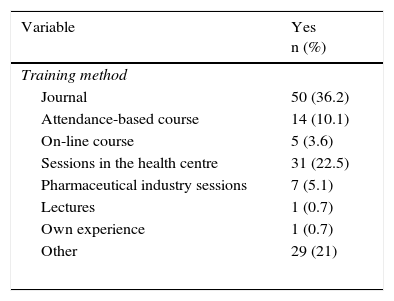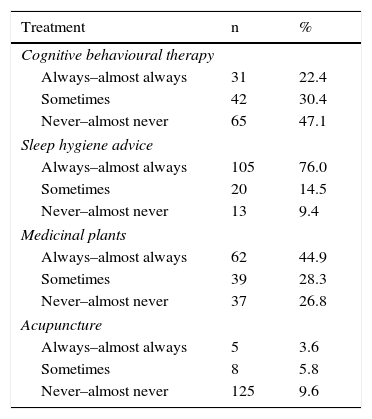To describe the knowledge, attitudes, and performance of primary care nurses in the management of patients with insomnia.
MethodsDescriptive study. An online questionnaire was sent to all primary care nurses of the Majorca Primary Care Department between June and July 2014. Measurements: sociodemographic variables, professional characteristics, tuition, usual clinical practice in the management of patients with insomnia.
Results138 nurses answered the questionnaire (47%). Most of them were women (92.8%), 50.42 years old (SD=8.9). The majority considered insomnia an important health problem. Only 11% had received some formative activity on insomnia in the last 5 years. Nearly half declares to ask patients about consequences of insomnia in their jobs and about habits that alter their sleep quality. 79.7% considered the possible adverse effects of insomnia drugs and take into consideration the age of patient (80.4%). The usual treatments were sleep hygiene (76%), phytotherapy (44.9%) and 22.4% cognitive behavioural therapy (CBT). This therapy is considered effective and applicable by nurses (63.7%) and doctors (58%). Those nurses who attended courses in the last 5 years apply CBT more frequently.
ConclusionsNurses conduct a correct anamnesis and evaluation of patients with insomnia. However some therapies of known effectiveness, such as CBT, are still scarcely applied.
Describir los conocimientos, actitudes y actuación de las enfermeras en un área de Atención Primaria sobre la atención al paciente con insomnio.
MétodosEstudio descriptivo. Se envió cuestionario online a todas las enfermeras de centros de salud del área sanitaria de Mallorca entre junio-julio de 2014. Variables: sociodemográficas, del profesional, formación, preferencias de manejo clínico del insomnio.
ResultadosRespondieron 138 enfermeras (47%). La mayoría mujeres (92,8%), media de edad 50,42 años (DE=8,9). La mayoría lo considera un problema importante de salud. Solo un 11% ha realizado alguna actividad formativa sobre trastornos del sueño en los últimos 5 años. Casi la mitad declara interrogar habitualmente sobre las repercusiones del insomnio en la vida laboral y sobre los hábitos que pueden alterar el sueño. El 79,7% valora posibles reacciones adversas de los medicamentos que toma el paciente para el insomnio y valora de forma diferente a los ancianos el 80,4%. Los tratamientos que declaran realizar habitualmente son medidas higiénicas (76%), fitoterapia (44,9%) y 22,4% terapia cognitivo-conductual. La terapia cognitivo-conductual es considerada efectiva y aplicable por las enfermeras (63,7%) y médicos (58%). Los profesionales que más se forman son los que practican de forma significativa terapia cognitivo-conductual con mayor frecuencia.
ConclusionesLas enfermeras realizan una correcta anamnesis y evaluación del insomnio, sin embargo algunas terapias de demostrada efectividad son todavía escasamente utilizadas.









